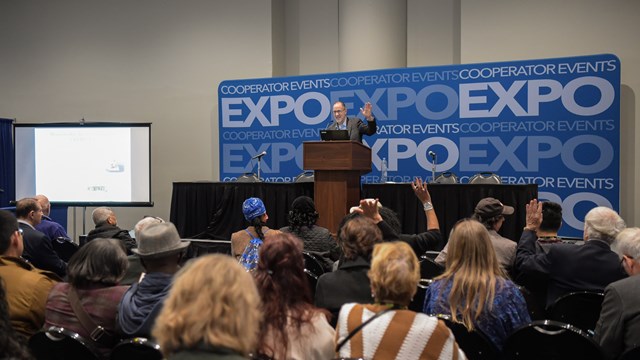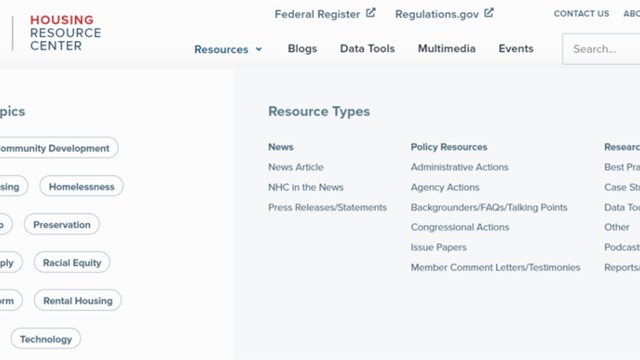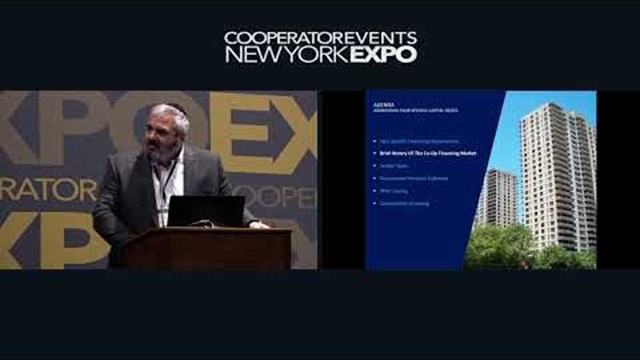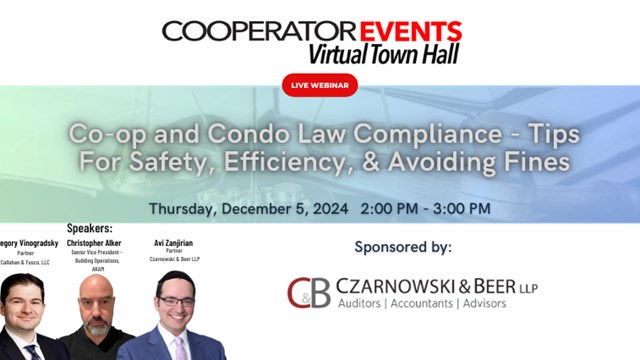
A cooperative, condominium or homeowners association is the cornerstone of a building community. The co-op, condo or HOA maintains order and continuity by preserving architectural integrity, maintaining the common elements, protecting property values, and often providing for recreation and/or entertainment for the community. Board responsibilities may run the gamut from basic maintenance to sophisticated special services. To be effective a co-op, condo or HOA needs a strong board of directors or managers who, individually and collectively, understand the role and mission of the association. Operating a co-op, condo or HOA involves many of the same responsibilities as any other business, although board members are volunteers and generally serve without compensation.
While some board members may have personal experiences from private life, working as accountants, attorneys, brokers, and managers, most come to their position on the board armed only with a desire to serve their building community. A newly elected board member will need solid instruction and training to fully understand their role and fiduciary duties. Serving as a board member can be a valuable service and a rewarding experience, but like any other position, proper training and instruction is a must. So who performs the training, and when and where do the instructions take place? There is no one simple answer, but several excellent options for motivated boards and board members.
Building an Informed Board
According to Steven Greenbaum, the director of property management at Mark Greenberg Real Estate (MGRE) in Lake Success, New York, “There are no laws mandating board training in the state of New York, but I feel obligated to prepare an individual, and arm them with knowledge.”
To accomplish that, Greenbaum believes in a proactive approach he calls “succession planning” in order to identify good prospects for future board positions. He looks for interested and/or involved residents who may or may not be already serving on a committee, and invites those individuals to sit in on a board meeting and observe the board in action. The visitor can see the nuances and timing of an actual meeting, and observe which board positions might be a good fit for his/her talents and interests. Greenbaum may suggest the individual serve as an assistant or intern. During this phase, a prospective board member can observe and participate in board functions such as reading, presenting and understanding a financial report. Additionally, Greenbaum supplies and reviews two years' worth of minutes for assistants and/or new board members.
Raymond Dickey is president of Brainerd Communications, publisher of AsociationHelpNow, and the executive director of CAI Big Apple, CAI Hudson Valley, and CAI South Carolina. He too believes in a proactive approach to board member development. “If you know someone who is interested in running for a board position, include them as much as possible in board activities prior to their being elected into their position, he says. This way, when and if that person is elected, they can hit the ground running. Also nominate potential board members from those who are regularly at meetings. These people already know a great deal about current issues in the building or association.”
Like Greenbaum, Dickey favors having new board members shadow a seasoned board member, “This will enable a seamless transition when that seasoned member’s term is up,” he explains.
Dan Wurtzel, president of management firm FirstService Residential New York, (FirstService is the largest property management company in North America), believes that some of the responsibility for educating new board members might lie with the manager themselves. “It is in the best interest of all parties to bring new members up to speed as quickly as possible so that they can be effective contributors,” he says.
His own firm does that by preparing a Board Member Resource Guide, detailing the responsibilities and fiduciary duty of new board members. Included in this guide are current and recent year’s audited financial statements, status of pending projects, current goals and recent achievements, service contract analyses, insurance information and schedules, and evidence of regulatory compliance. “This indispensable reference book also contains the building’s offering plan, declaration (condos), proprietary lease (co-ops), bylaws, and house rules, as well as minutes from past board, special, and annual meetings,” states Wurtzel.
An Educated Board
Greg Carlson, a property manager himself, who is the executive director of the Federation of New York Housing Cooperatives & Condominiums (FNYHC), president of both the National Association of Housing Cooperatives (NAHC), and the New York Association of Realty Managers, (NYARM), and treasurer for the Council of New York Cooperatives & Condominiums (CNYC), says that despite the fact that New York does not mandate training, “No training is not acceptable.”
He acknowledges it takes some time for a new member to get up to speed, and the learning curve can bog down a meeting when new members frequently ask for clarity and explanations, but that's all for the good. “An educated board is an efficient board,” he says.
Until official credentialing of board members is required by law, Attorney Marc H. Schneider, founding partner of the law firm of Schneider Mitola LLP, with offices in Garden City and New York City, says “There are several avenues where training and information are available for a board member to learn how to do a better job.”
He recommends utilizing the professional expertise of the managing agent, the board attorney, and the accountant to prevent mistakes. “They are your biggest resources,” he explains. Schneider also has personal knowledge of the issues boards frequently face since he has served as board president for his own co-op. “I know what it means to have a knock on the door at midnight,” he says. While Schneider recommends utilizing your board professionals as a first line for training, he doesn’t suggest stopping there; he recommends and contributes to local board educational opportunities.
Utilizing Outside Tools
Schneider drafted notes for the New York Condo Act, and regularly teaches classes on how a board should deal with request for reasonable accommodations and/or modifications. He explains applicable laws on federal, state, and local level,s stressing the importance of a timely response for a request for accommodations in order to prevent expensive legal intervention.
In his role with NAHC, Carlson oversees annual conferences nationwide for board training and is involved in preparing videos on board training. Additionally, he provides a six-hour course for boards motivated to improve their knowledge and performance. “I visit the building community, obtain their documents, and teach a professional training for the board,” he says. Carlson also partners with attorney Marc J. Luxemburg, president of the CNYC to teach a basic class several times a year (check the CNYC website for the 2016 schedule for these small, 2-3 hour classes.)
At a local level, Carlson says he encourages the use of various real estate and trade websites, including NAHC, FNYHC, CNYC and NYARM, for information on classes, trade shows and upcoming educational events. “The Cooperator's annual Expo and the CNYC’s own trade show offer several educational seminars, as well as opportunities to meet with vendors and industry professionals. Carlson also recommends monthly trade publications like The Cooperator as required reading by all board members.
Greenbaum agrees on utilizing any and all local opportunities for board education. He also suggests that board members attend The Cooperator Expos. “They’re one-day events, a couple of times a year, and well worth the time. NYARM breakfast meetings are another excellent opportunity for panel discussions and presentations.” The next Cooperator Expo will take place Wednesday, April 13, 2016 from 9 a.m. to 4:30 p.m. at the New York Hilton Midtown.
Wurtzel invites board members to participate in his firm's Learning Center courses. This hands-on, practical training is required for all FirstService property managers, and can help board members function well as a group with a common interest.
For his part, Dickey encourages new board members to participate in CAI chapter events, and to network with others in the same volunteer board positions, as well as any and all industry professionals who currently work with—or might be of future use to—their building or association. “There are a great many professionals, including engineers, attorneys, bankers, insurance specialists, and others who focus solely on the co-op, condominium, and HOA industry,” he explains. “The information made available by these folks is invaluable to new and current board members.” Go to CAIonline.org to find your local chapter. New York City has the Big Apple CAI and CAI-Long Island; there are also chapters for the Hudson Valley and Western New York.
Other organizations Dickey recommends include the Building Owners & Managers Association (BOMA), and the Institute of Real Estate Management (IREM), which has its own New York City chapter as well.
He encourages new board members to get on the mailing list for the local chapters of these organizations. Email blast and printed mailers will notify when the groups have a seminar or conference. “Many of these events are low cost or free to attend for homeowner board members,” he says. Dickey also recommends periodicals like The Cooperator that focus on the industry and bring issues to the attention of board members concerning the day to day running of a co-op or condo.
All the Moving Pieces
Carlson reminds board members that when all is said and done, the board should work, make decisions, and lead as a unit. Schneider agrees, explaining that a board member must act in the best interest of the building or the building community, putting personal interest aside. He uses a succinct message to convey that same thought when he states, “When walking into the board room take off your 'I' cap and put on your 'We' cap.”
Dickey offers one last piece of advice for all board members: “Remember that this industry is constantly changing. Laws change, and new obstacles - such as ways associations deal with Internet security or recent powerful storms, for example. A standardized orientation is great, but the pursuit of knowledge should never stop.”
Anne Childers is a freelance writer and a frequent contributor to The Cooperator.









4 Comments
Leave a Comment